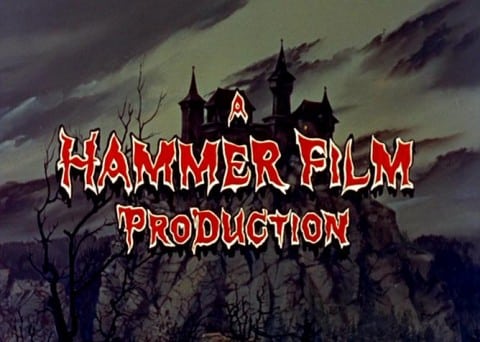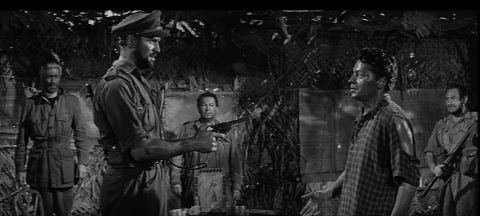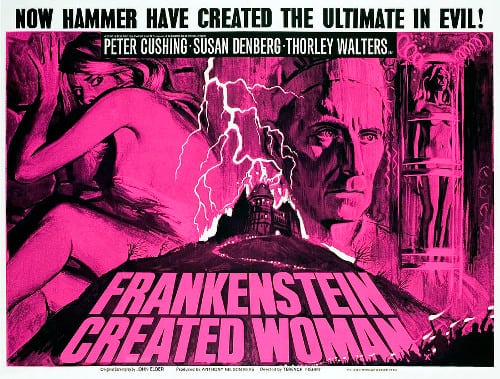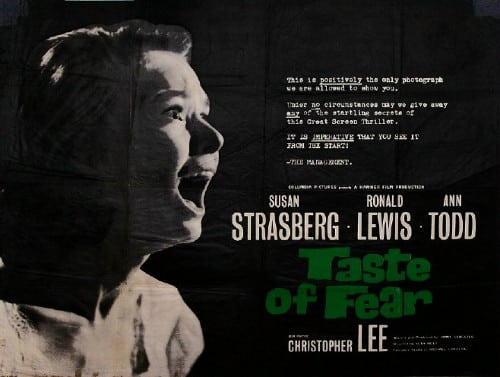Yesterday's Enemy (1959)
Directed by: Val Guest
Written by: Peter R. Newman
Starring: Gordon Jackson, Guy Rolfe, Leo McKern, Stanley Baker
UK
AVAILABLE ON DVD
RUNNING TIME: 95 min
REVIEWED BY: Dr Lenera, Official HCF Critic
The last remnants of a British Army Brigade headquarters, led by Captain Langford because the most senior officer is wounded, makes its way through the Burmese jungle, retreating from the Japanese. They arrives at a small village which is occupied by the Japanese. After a short but costly battle, the enemy group is wiped out. Among the Japanese dead is a Colonel, an unusually high-ranking officer to be with such a small group, and possessing a map with unknown markings. Langford interrogates a Burmese informer caught trying to flee and, despite objections from some of his men, orders two other villagers to be shot if he doesn’t cooperate….
Though I was unable to legally view 1957’s The Steel Bayonet, I think it’s obvious from the ones that I did get to see and review that Hammer was pretty good at war movies, even if the films seem to be fairly obscure. Yesterday’s Enemy could be the best non-horror film from the studio in my chronological run-through that I’ve watched so far, and it’s almost criminal that this powerful anti-war drama isn’t more well known and considered more highly in films of this nature, especially as it got good reviews when it came out in cinemas [it seems funny these days that Columbia asked Hammer to edit out numerous uses of the word “bastard” for its American release] and was even nominated for some BAFTAS, quite amazing considering the usual response to Hammer’s product. Lord Mountbatten, seated next to producer Michael Carreras at the premiere, said that he could actually recognise bits of the Burmese jungle on screen. Carreras didn’t have the heart to tell him that the whole thing was shot at Bray and Shepperton studios. To modern eyes, that’s the film’s one notable flaw – the sets, while quite elaborate, are rather unconvincing, which is fine for a Gothic fantasy horror but not a realistic war picture – but after a while one just forgets about that, largely due to the intelligent script by Peter Newman, who adapted his own BBC teleplay for the screen, itself based on a true war crime perpetrated by a British army captain in Burma in 1942.
Right from the beginning the dialogue coming out of the soldier’s mouths sounds reasonably realistic while, despite avoiding any graphic violence, the whole film is extremely tough, uncompromising and downbeat, failing to even take sides, the cruelty perpetuated by the Japanese in the second half not really seeming so bad considering we’ve hardly seen British troops in the best light either during the first half. I was rather shocked [remember this is a film from 1959] when, early on, Captain Langford orders his men to shoot two Burmese villagers to make his captive divulge important information, but what makes it especially uncomfortable is that it turns out that Langford may have been right to do so – the prisoner did actually have vital knowledge and it’s knowledge that could save thousands of lives! The film examines the cruel logic of war which is probably carried out routinely – whatever action best promotes the winning of the war is the correct action even if it violates traditional rules of morality – and never loses its uncomfortable tension even if the initially quick pace slows down a bit when the film becomes largely dominated by dialogue [but such fine dialogue it is!]. Stanley Baker’s performance as Langford is the very best I’ve seen him give – you can tell how conflicted internally he is by what he feels he has to do, especially by his eyes – while Guy Rolfe and Leo McKern, as the ‘conscience’ of the group, give fine support. Of course the perennially underrated Val Guest contributes fine direction in his now perfected semi-documentary fashion, helped here by the fact that there is no music. Yesterday’s Enemy is undoubtedly hampered by its budget, but it still packs a powerful punch and really makes you think about the issues it raises.











Be the first to comment